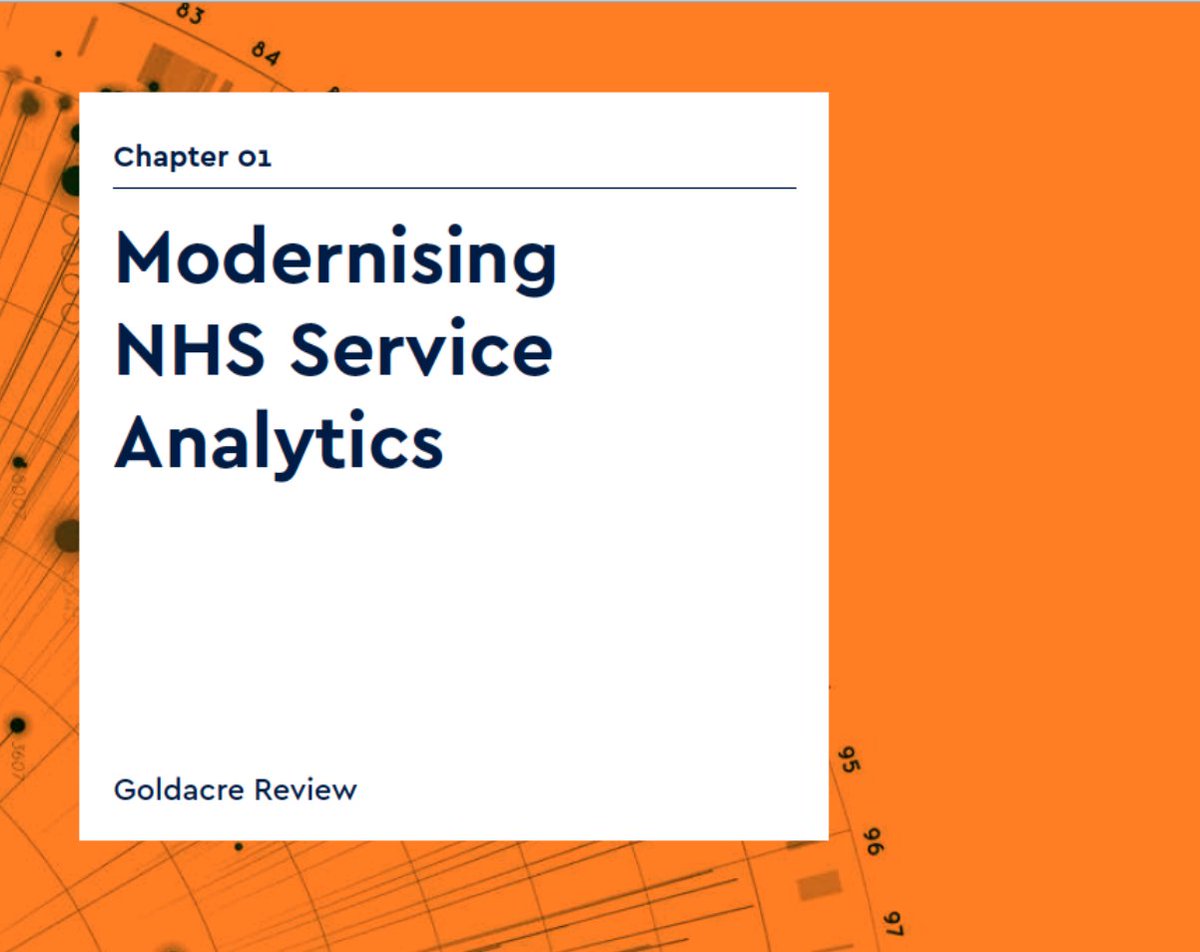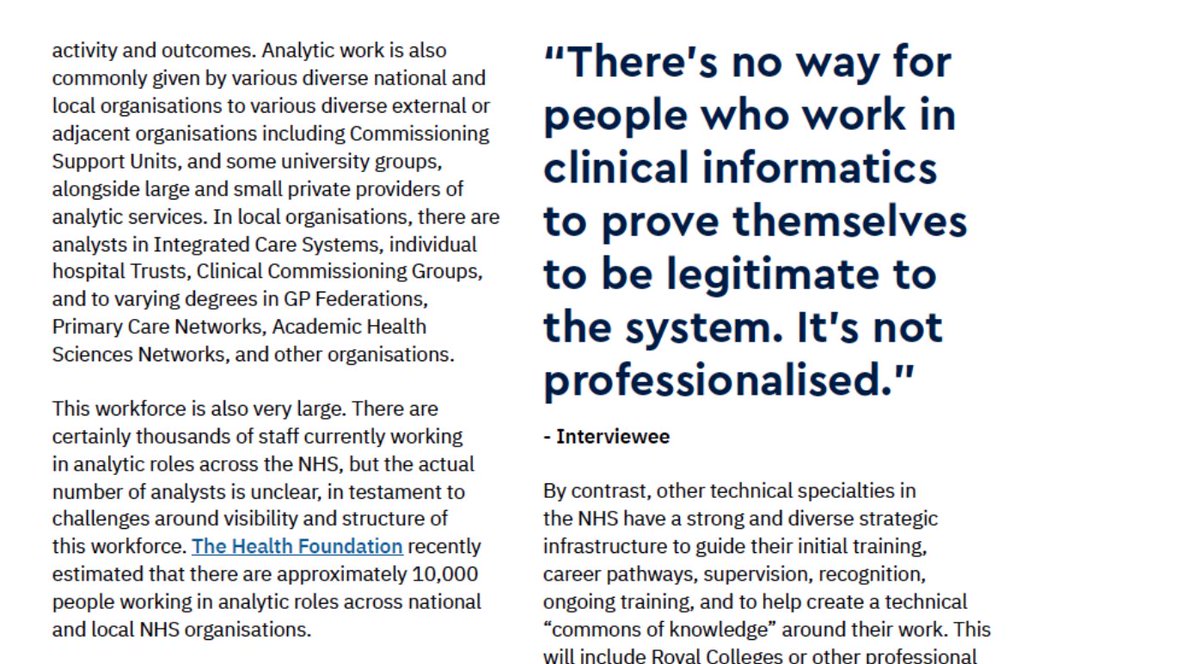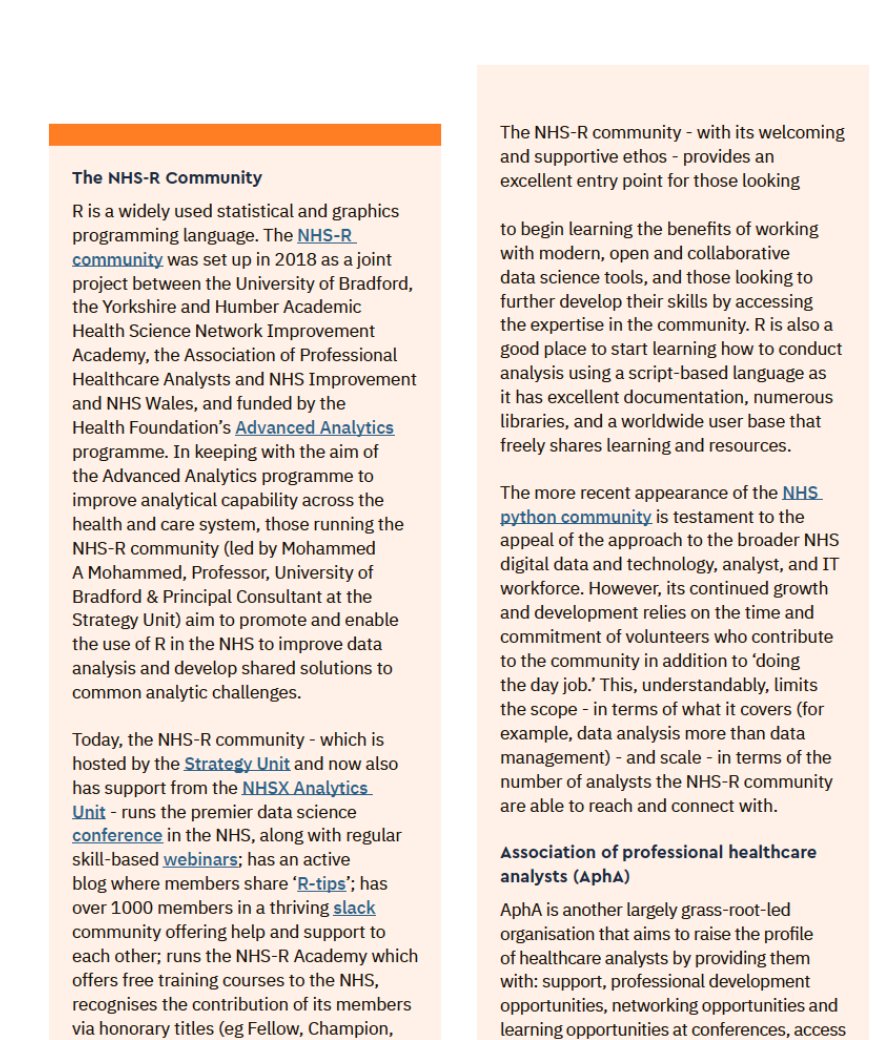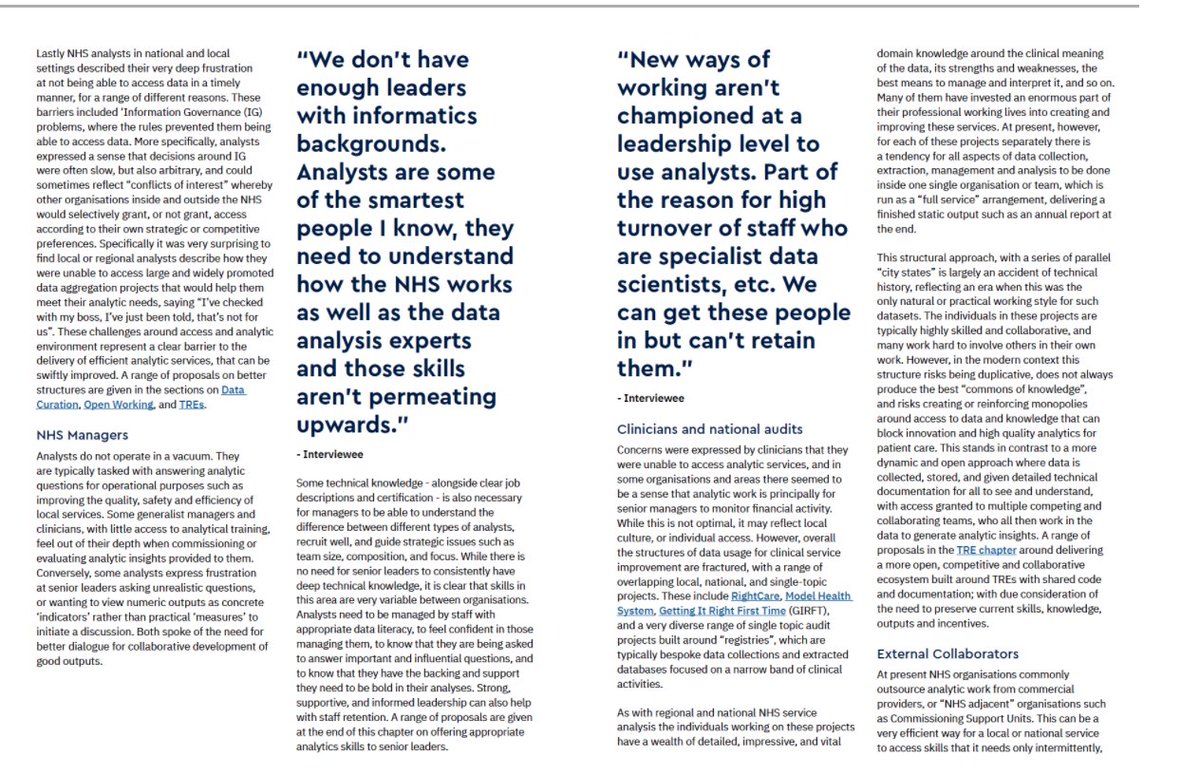RIGHT. You’ve all had a weekend to digest the @bengoldacre review. There’s a lot to take in, so let’s do some deeper dives into content. Let’s start at the very beginning, since I’ve heard it’s a very good place to start: NHS service analytics. https://twitter.com/jessRmorley/status/1512013395897339909">https://twitter.com/jessRmorl...
There are 000s of analysts across the NHS. They are the hidden heroes of service improvement. They take data & use it to identify opportunities for improving the quality, safety,& cost effectiveness of services; to model waiting lists; to measure the impact of new interventions.
These kinds of analyses deliver direct improvements in patient care & require considerable skill (raw data must be managed, curated, processed, analysed, presented, and interpreted before it can generate action) & a unique mix of clinical, operational & technical knowledge.
The work of NHS analysts demonstrates why the NHS needs outstanding data analysis, not just in academia, but at the clinical coalface, generating insights that help clinicians and decision makers make informed choices that directly improve care for millions.
In short, NHS analysts, whether located inside central organisations (DHSC, NHSE), Arms Length Bodies (NICE, CQC, NHSBSA), commissioning organisations (CCGs, STPs, ICSs), NHS Trusts, or in support organisations (e.g., CSUs) are a vital part of the NHS workforce.
In talking to a wide range of analysts from all these types of organisations, & at different levels of seniority, we found that despite the very many pockets of world-class excellence, the analytical workforce as a whole has become very dispersed and isolated.
Unlike other technical NHS professions, or other analytical professions in Government, NHS analysts currently have no formal professional body; v. little structure around training or CPD; & lack clear technical JDs or qualifications specific to NHS analytics
Whilst data scientists outside the NHS are some of the most sought after staff in the world, & are paid as such, NHS analysts are still classed as “admin/ clerical” staff rather than “scientific/clinical” & struggle to be fairly rewarded for their skill.
There are small grassroots organisations, led largely by amazing volunteers, trying to combat the effects of this lack of structure & help NHS analysts professionalise & build up a commons of knowledge inc. AphA, UK FCI, NHS-R, NHS-python, AnalystX, Health Foundation ++
These (& other) groups have done, and continue to do, a phenomenal job, but they cannot scale without proper resource, & support. Furthermore, there’s only so much a bottom-up approach can achieve with insufficient championing from the top.
We were told many times that analysts often feel as though senior management lack the analytical skills (though they have other important adjacent skills) to properly task & develop their analytical teams, & to understand why analysts might need access to certain tools.
In particular analysts spoke of being denied access to key tools such as GitHub, python, R, as senior management didn’t see the need to actively champion their use & local IT teams didn’t have the skills to implement these, or felt ill-equipped to securely approve their use.
All of these structural issues (none of which are deliberate) act as barriers to retention, and increase reliance on outsourcing which, in itself, further hampers the NHS’s ability to maintain & develop in-house analytical capability.
Furthermore, most of these barriers are only ‘hit’ after NHS analysts have gained access to the data they need in order to conduct their analysis. This in itself is often a highly fraught process given lack of access to standardised TREs.
At the other end of the development pipeline, after data access & analysis, many analysts raised concerns about a misunderstanding about the differences between open data & open code (amongst other misunderstandings/ misgivings), preventing them from sharing their code & methods
Keeping code closed blocks opportunities for external scrutiny, iterative improvement, error detection, and re-use by other NHS analytical teams, introducing inefficiencies that could be avoided by wider adoption of modern, open, computational approaches to NHS analytics.
Recommendations to overcome these, and other barriers to better, broader, and safer NHS service analytics are in Chapters 1, 2 & 4 (NHS service analytics, open working, and TREs).
In Chapter 1, we make recommendations related to: professional structures; training; platforms & data access; & external collaborations covering everything from the need to introduce “Data Pioneer Fellowships” to Revising NHS IT policies. 28 recommendations in total.
These 28 are summarised into the following 6 recommendations:
1. Create an NHS Analyst Service modelled on the Government Statistical Service, with: a head of profession; clear JDs tied to technical skills; progression opps to become senior analysts rather than managers; & realistic salaries where expensive specific skills are needed.
2. Embrace modern, open working methods for NHS data analysis by committing to Reproducible Analytical Pipelines (RAP) as the core working practice that must be supported by all platforms and teams; make this a core focus of NHS analyst training.
3. Create an Open College for NHS Analysts: devise a curriculum for initial training & CPD, tied to JDs; all training content should be shared openly online to all; and cover a range of skills and roles from deep data science to data communication.
4. Recognise the value of knowledge management: create and maintain a curated national open library of NHS analyst code and methods, with adequate technical documentation, for common and rare analytic tasks, to help spread knowledge and examples of best practice across
5. Seek expert help from academia and industry, but ensure all code and technical documentation is openly available to all, procuring newly created “intellectual property” on a “buy out” basis. Commission “Best Practice Guidance” on outsourcing data analytics.
And last, but by no means least,
6. Train senior non-analysts and leaders in how to be good customers of data teams.
6. Train senior non-analysts and leaders in how to be good customers of data teams.
That’s all for now folks. Back tomorrow with chapter 2: Open Working!

 Read on Twitter
Read on Twitter





